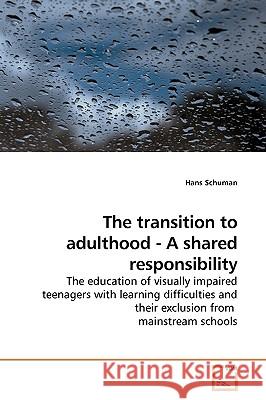The transition to adulthood - A shared responsibility » książka
The transition to adulthood - A shared responsibility
ISBN-13: 9783639195958 / Angielski / Miękka / 2009 / 276 str.
This book presents a critical review of a five year research project which aimed at developing an empowering curriculum for visually impaired teenagers with learning difficulties. Based on a growing body of literature, four approaches were identified to support the educational practitioners to evolve into change agents who assume collective responsibility and ownership for the change process: the ideas of the learning organization, the social model of disability, McClelland's model of the iceberg, and making use of a discussion technique called intervision. Participatory action research, with its focus on emancipation through collective, informed and democratic action, provided the necessary framework to integrate these four approaches and to inform, underpin and guide the change process. An important conclusion is that teenage students with challenging multiple disabilities and learning difficulties are capable, when they are allowed, challenged and taught, of advocating for themselves, developing clear views about how they want to live, manage their lives and make informed decisions which best fit their personal needs and objectives.
This book presents a critical review of a five year research project which aimed at developing an empowering curriculum for visually impaired teenagers with learning difficulties. Based on a growing body of literature, four approaches were identified to support the educational practitioners to evolve into change agents who assume collective responsibility and ownership for the change process: the ideas of the learning organization, the social model of disability, McClellands model of the iceberg, and making use of a discussion technique called intervision. Participatory action research, with its focus on emancipation through collective, informed and democratic action, provided the necessary framework to integrate these four approaches and to inform,underpin and guide the change process. An important conclusion is that teenage students with challenging multiple disabilities and learning difficulties are capable, when they are allowed, challenged and taught, of advocating for themselves, developing clear views about how they want to live, manage their lives and make informed decisions which best fit their personal needs and objectives.











